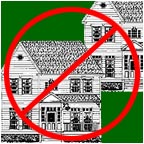


Protect the Partrick Wetlands
and our Community
![]()
|
|

|
At a hearing last night to get ideas from the public on how to control
creeping development, state Rep. Lew Wallace, D-Danbury, told about 60
people gathered at City Hall how property taxes encourage sprawl.
"The problem is the way we use land in our state and the way we tax land in
our state," said Wallace, House chairman of the Planning and Development
Committee. "One of the reasons there is sprawl is because municipalities
need cash revenue - the tax base - to provide the services their
constituents want, whether it's new schools, fire or police."
Wallace said the state is losing farmland at twice the national average, and
over the past 10 years, auto travel and car registrations have increased
more than 35 percent while the state population rose 10 percent.
Those and other problems led his committee to set up a blue-ribbon commission
on property tax burdens and smart-growth incentives, which issued a 55-page
report in October. The report outlines how property taxes fuel urban sprawl
and what should be done about it.
The report blames high property taxes for forcing communities to adopt
land-use policies primarily designed to grow grand lists and maximize
property tax revenues. It blames high property taxes for residential urban
flight, businesses and industry leaving cities for rural areas and an
antifamily bias in land use laws.
Norwalk Mayor Alex Knopp, a member of the blue-ribbon commission, said more
financial help from the state is needed to curb municipalities' reliance on
the "regressive, unfair and cruel" property tax system.
"One of the real advances of this blue-ribbon report was for the first time
it tends to link the problems with property taxes and the problems with
land-use development and environmental growth in Connecticut," Knopp said.
"We have had a hard time as mayors and as urban legislators to get enough
people in the state interested in property tax reform to change the outlook
in the Legislature and the executive mansion."
To help diversify the revenue stream to cities and towns, Knopp called for
the continuation of a hike in the real estate conveyance tax that the
Legislature approved as a one-year program in 2003 to help cash-strapped
municipalities. The tax is expected to bring more than $3 million into
Norwalk coffers by the end of June.
He also repeated his call for other reforms, including a homestead exemption.
It would allow the first $50,000 to $70,000 of a homeowner's assessment be
wiped off the books.
The exemption would shift the property tax burden to more expensive
properties and businesses, Knopp said.
Matthew Mandell, president of the Partrick Wetlands Preservation Fund of
Westport, told Wallace and fellow committee member state Sen. Bill Finch,
D-Bridgeport, that sprawl is increasing in Norwalk and Westport.
Mandell pointed to a possible 23-home development being considered for the
White Barn Theater property in the Cranbury section of Norwalk and a
proposed 22-home development on the F.D. Rich site, also known as the
Partrick Wetlands in Westport.
The Partrick Wetlands site is dependent upon a sewer line being extended from
Norwalk to the rural 55-acre property. In October, Knopp formed a task force
to examine development in the area and make a recommendation on the sewer
line extension.
Mandell said he was against the extension.